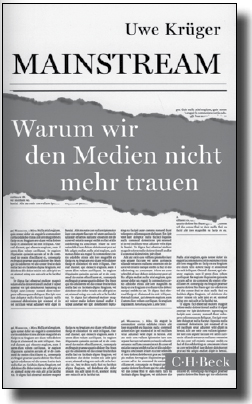Fulfil the journalistic professional ethics and the political culture of democracy
Fulfil the journalistic professional ethics and the political culture of democracy

by Urs Knoblauch, cultural publicist, Fruthwilen (Switzerland)
When visiting the Book Fair in Leipzig one does not only come across valuable new publications but can also meet with the authors and the interested public. So the book presentation of Uwe Krüger’s new book ‘Mainstream – Warum wir den Medien nicht mehr trauen’ (Mainstream – why we no longer trust the media) gave a current insight into the transatlantic embedded leading media and into the related working conditions of journalists. Uwe Krüger also pointed to the growing number of critical users of media.
Uwe Krüger is a research associate of the Department of Journalism at the University of Leipzig. His doctoral thesis of 2011 ‘Power of opinion – the influence of elites on leading media and Alpha-journalists - a critical network analysis’ was published in 2013 in the book series of the Institut für praktische Journalismus- und Kommunikationsforschung (IPJ).
His newly published book dwells very differentiated on the rightful loss of confidence and the problematic labour- and interdependencies of today’s journalism. Likewise, the political and economic involvements of elites and mainstream media are illustrated very clearly. Uwe Krüger gets to the bottom of the alarming mainstream effect, showing “how lobbying networks, confidential background circles, the social background of journalists and the dramatic deterioration of working conditions in the sector, restrict the range of views “ (blurb). From the few exclusive journalism schools the suitable candidates are recruited for the mainstream leading media and elite training centres. Serious researching journalists suffer from these conditions, requirements, time pressure and the increasing influence of PR-actors.
If you believe an opinion poll of December 2014 for Zeit online, ‘then 47 percent of the Germans think that their media report unilaterally. By now many people have the impression that they are reading the same everywhere ‘(blurb). The fact that people turn more and more away from this largely manipulative media scene and looking for independent and alternative media, is a good sign. Even the programme advisory board of the ARD (‘Consortium’ – of the public-law broadcasting institutions of the Federal Republic of Germany) had to admit that, for example in the Ukraine crisis in June 2014, ‘the reporting in the German TV channel ARD, The First, gave the impression of bias and had a tendency against Russia and the Russian positions’ (p. 14). By numerous examples Uwe Krüger’s book states the aims and the background of these transatlantic controlled information and political campaign journalism.
Dangerous lockstep of the leading media
Media elites regularly come together in familiar coteries. Furthermore, they are welcomed within the Federal Chancellery and, by the way, ‘informed’ and oriented on current political issues according to government’s wishes. Critical and independent voices are not desired. Numerous media workers who do not drop their professional ethics have to bear the consequences. Especially young journalists are under the burden of great social insecurity. ‘According to the Federal Employment Agency about 5,000 journalists and editors in Germany are unemployed.’ (p. 49)
In the ‘reports of the mainstream media’ on the occasion of the Ukraine crisis, former Minister of Culture and present professor of philosophy Julian Nida-Rümelin criticizes that important questions are not asked and that ‘the journalistic precepts of carefulness and completeness, distance and objectivity are violated’ (p. 17). Therefore, he recommends, ‘In order to have a complete picture, one is well advised to rely not only on the mainstream media, but also to use further sources of information.’ Especially the big media show ‘striking little resistance with regard to an ideologization of Western foreign policy’ (pp. 17). Additionally, Nida-Rümelin states in this context: ‘In a developed democracy however, one may expect […] a certain critical distance towards NATO- and CIA-controlled information.’ (p. 18).
With a strategy of double standards, chancellor Merkel’s formula of a ‘market-conforming democracy’ (p. 128) or concepts such as ‘humanitarian intervention’, the real political and economic intentions are concealed to the citizens. Uwe Krüger refers in this context to the British political scientist Colin Crouch, who, with the concept of “post-democracy”, describes a deception of citizens in democratic elections.
Through ‘competing teams of professional PR experts the public debate during election campaigns is controlled in such a way that they deteriorate into a pure spectacle.’ On ‘this political stage real policy is made behind closed doors’, and prepared by networks of elites (p. 132).
Citizens have a right to honest information. In a democracy, people need to rely on true information by media and politics. It has always been by means of disinformation, lies and propaganda that wars have been possible. However, it is based on good faith that coexistence in peace is possible. In the field of media and journalism, ethics and civic responsibility for the common good form the essential basis. •
Uwe Krüger. Mainstream. Warum wir den Medien nicht mehr trauen. C.H.Beck, München 2016, ISBN 978-3-406-68851-5